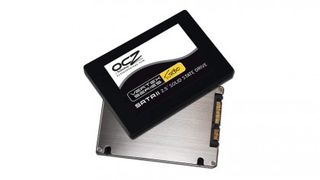Could a gaming laptop replace your desktop PC?
Power to the portable people
RAM
Laptops aren't known to be modular, but most of them allow you to swap out RAM. In fact, some will even let you plop in up to 32GB, which is more than enough for gaming and everyday tasks. In terms of pricing, both are pretty competitive, with the cost equalling roughly $10 per gig of DDR3 on either platform.
If we had to give one platform the nod, it would have to go to the desktop. Some gaming laptops, most notably the really thin ones, make it difficult to access the RAM slots. Typically, the only way to do this is to completely unscrew the notebook's base, which usually voids the warranty.
WINNER: DESKTOP

Storage
For a long time, smaller 2.5-inch laptop drives have generally been smaller and/or pricier than traditional 3.5-inch HDDs. With SSDs coming down in price and increasing in storage capacity, however, laptops can now offer a decent amount of storage at a reasonable cost. And with m.sata SSDs being so tiny, you don't have to sacrifice thinness for storage space.
Still, it's almost comical to even compare the advantages of a desktop when it comes to storage, where your biggest limiting factor is how many SATA ports you have. This means you aren't constrained to using just 2.5-inch laptop drives. Knowing you can expand your storage by 4TB simply by plugging in one SATA cable... that's a good feeling.
WINNER: DESKTOP
Keyboard
We all love our mechanical keyboards, which have been a mainstay of gaming desktops for years, so you're probably thinking this is an easy win for the desktop column, right? But while most gaming laptop keyboards merely get the job done, they are also "free." In addition, you could always hook up a mechanical keyboard to your gaming laptop if you need to get your clickity-clackity fix. While you may scoff this off as awkward, it's actually fairly common at big national LAN events.
Get daily insight, inspiration and deals in your inbox
Get the hottest deals available in your inbox plus news, reviews, opinion, analysis and more from the TechRadar team.
Furthermore, some gaming laptops like MSI's GT80 will be shipping with integrated mechanical keyboards, though the jury is still out on how well they'll work.
WINNER: LAPTOP
Monitor
There's a lot of quality variance when it comes to laptop monitors. We're beginning to see a lot of UHD panels out there, and then there's also the IPS versus TN facet to consider. Most gaming laptop monitors come in the 60Hz variety, unless they support stereoscopic 3D, but those have been rare birds since stereoscopic 3D glasses failed to take off.
But even if you've got a crummy 1080p TN display, you could always plug a nice discrete monitor into the laptop. Like the keyboard category, free is better than not free, and you still get the discrete monitor.
The one big downside is that laptop displays are smaller, and you can't raise their screens with a stand. Those quibbles aside, though, free monitor beats not-free monitor.
WINNER: LAPTOP
Portability
Desktops may have the power and the modularity, but it's tough to beat the portability that a laptop offers. Even if you could get a powerful PC in a relatively small mini-ITX form factor, they're still bigger and heavier than the fattest gaming laptops out there. Plus, you've got to lug around a monitor, keyboards, and cables galore. For situations like LAN parties, ain't nobody got time for that.
WINNER: LAPTOP

Conclusion
With the freedom to easily swap out components, coupled with the power they offer, it's clear the desktop PC isn't going anywhere. Having said that, however, as good as the desktop platform is, you shouldn't dismiss gaming laptops too swiftly. They've come a long way and are getting more powerful with each passing year. Believe it or not, the performance gap is narrowing (though it's unlikely to ever catch up completely).
Furthermore, a lot of the other issues that have plagued gaming laptops, like size, weight, and noise, are slowly being ironed out. In short, we think you should allow plenty of room at the table for both a desktop and a gaming laptop.
Current page: RAM, storage, keyboard, monitor and portability
Prev Page GPU, CPU and sound Next Page Modern high-end mobile GPUs